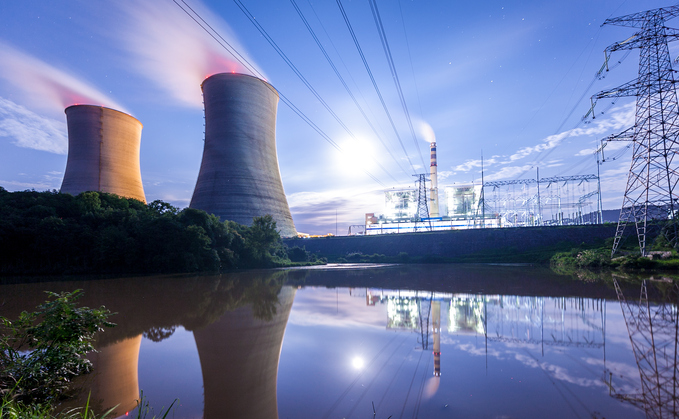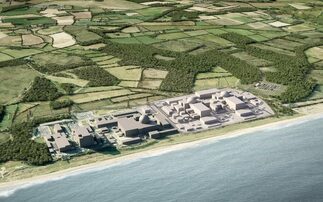
A hugely influential new essay on how to revive the UK's flat-lining economy makes a compelling case for sweeping reforms, but its plan to decarbonise the economy risks delaying the clean energy transition
There was much excitement on 'Policy Wonk Twitter' late last week following the publication of the first serious attempt from the right of British politics to explain 'what the hell just happened back there?'
The essay from Ben Southwood, Samuel Hughes, and Sam Bowman, titled Foundations - Why Britain has stagnated, is an exceptional piece of work - thought provoking, thoroughly researched, and elegantly argued. Michael Gove called it "quite brilliant, and urgently necessary"; Tory MP and former Number 10 advisor Nick Timothy hailed it as "a leap forward for Conservative economic policy"; Tory leadership frontrunner Robert Jenrick said it made an "unanswerable" case for sweeping reforms to "build the homes, infrastructure and energy projects our country needs".
One of the essay's many strengths is the way it can command such rave reviews from Conservative grandees when it amounts to an utterly damning (albeit often tacit) indictment of the 14 years of economic failure overseen by the last government.
The plaudits are largely deserved. The central thesis - that the UK's economic performance has been appalling for far too long and a planning system that is not fit for purpose is a huge part of the reason why - is compelling. The case is well made and backed by mountains of data points.
As evidenced by Rachel Reeves' speech to the Labour Party Conference yesterday and its promise to deliver "a sight that we have not seen often enough in our country - shovels in the ground, cranes in the sky, the sounds and the sights of the future arriving", there is a growing consensus across the political spectrum that we need to build more and build faster. It is great to see influential voices from all sides of politics recognising that urgent and sustained change is needed.
It is also encouraging to see how the Foundations essay does not contest that the UK must respond to the climate crisis and has no choice but to rapidly decarbonise. "Climate change is a serious challenge," it states. "Britain has committed, with the rest of the developed world, to bringing its carbon emissions down significantly over the next three decades. Greenhouse gas emitters do not bear the true costs they impose on the world. A (border adjusted) carbon tax that made them pay the social cost of the emissions they created would make the true costs of their emissions clear, and would make cleaner forms of energy significantly more cost-competitive, and possibly outright cheaper."
Too many influential figures on the right are currently trying to wish away the fact the UK and the world has to get to net zero emissions as quickly as possible or else face a rolling catastrophe. It is good to see the essay refuses to engage with these forms of soft climate scepticism.
All that being said, the text's immediate impact and undoubted influence - journalist Ed West described it this morning as a "ground-breaking essay [that] feels like something historic: a diagnosis of where things have gone wrong for us" - makes it all the more important to note how for all its impressive research the section on energy in particular should not be taken as gospel. Indeed, some of its core claims are highly contested and run directly counter to the broad consensus on the best, fastest, and most cost-effective way to decarbonise the UK's energy system. Many respected institutions and experts disagree fundamentally with the authors' core argument that renewables are inherently flawed and it is nuclear that will ultimately resolve the UK's economic, energy security, and climate woes.
No one can model the most cost-effective energy mix with absolute confidence, because there are so many unknowable variables - chief amongst them future gas prices. But many analysts would argue the essay is much too bearish towards the plans for a renewables-dominated grid and far too bullish on the prospects for a grid dominated by new nuclear projects.
The authors argue that renewables are fundamentally flawed because they require long term clean power contracts and are variable in nature, meaning they are reliant on subsidies and result in higher systems costs that are too often downplayed.
But the truth is these system costs are not ignored. The International Energy Agency (IEA), the Climate Change Committee (CCC), the National Infrastructure Commission (NIC), the Intergovernmental Panel on Climate Change (IPCC), and many other acronymed institutions have looked at these long-standing concerns and concluded that even when system costs are accounted for renewables present the most cost effective route forward and will provide the backbone of the future clean energy system both domestically and internationally. Nuclear, carbon capture and storage (CCS), and other technologies are predicted to play an important, but much smaller role.
For example, the IEA's latest 1.5C pathway is pretty clear on this with renewables tripling by 2030 and then tripling again by 2050, while nuclear only doubles from now to 2050. The CCC sees renewables at 70 per cent of the power mix in the UK in 2035, with nuclear and bioenergy at 20 per cent. The IEA's Fatih Birol recently described the global clean energy transition as "irreversible", as he highlighted how 85 per cent of new power capacity in 2023 was renewables, compared to five per cent nuclear and 10 per cent fossil fuels. It is not just the UK that is finding that renewables really do offer the cheapest form of new generation capacity, even when system costs are considered.
There's a hugely detailed technical debate to be had here, but the idea renewables will inevitably lead to higher costs in perpetuity is well outside the consensus view. The much-cited analysis from Aurora Energy Research on Labour's 2030 target found it would cut consumer bills by more than a 2035 goal, or continued gas power reliance. Cornwall Insight recently calculated the most recent wave of clean power contracts would add about £4 a year to bills by 2030. And these contracts could feasibly lead to lower bills overall due to the reduced wholesale power costs that would result from being less reliant on gas. The idea renewables inevitably mean ever higher costs is hugely questionable. Meanwhile, Foundations barely touches on how the primary driver behind the recent increases in energy prices has been the UK's outsized exposure to volatile fossil gas prices.
In fairness, the essay does reference some of the things that could curb the cost of a renewables-dominated system - energy storage and smart grids, planning reform, locational pricing, interconnectors, moving green levies into taxation - and misses some others - such as a near complete end to gas imports and the lapsing of the Renewables Obligation and early Feed-in Tariff contracts.
But it really underplays the potential for a renewables-dominated system to overcome the issue of variability and deliver low-cost clean power abundance at pace and scale, precisely as we're already seeing happen in a growing number of markets worldwide. There are plenty of expert voices, including a lot of energy companies, grid operators, and investors, who think a lot more renewables in conjunction with some additional nuclear and carbon capture capacity remains the best route for delivering clean power at low cost.
Equally, the essay's central claim that cost competitive nuclear is ready and waiting if we just relaxed regulations seems heroically optimistic. This is not to say the government shouldn't embrace many of the reforms proposed by the authors. There is no doubt aspects of the UK's planning and nuclear regulatory regime are gold-plated and have become counter-productive. It is somewhat amusing to see so many prominent Tories suddenly becoming boosters for new nuclear projects, when their record after 14 years in office was to deliver half of one reactor that is massively late and over budget.
Labour now urgently needs a new nuclear strategy that can, at a minimum, replace the capacity that is due to retire over the next decade. Planning and regulatory reform should be a part of that plan. There are undoubtedly changes that can be made that would help reduce costs and fast-track new projects. It was encouraging to see Energy Security and Net Zero Secretary Ed Miliband name checking new nuclear projects as part of his plans to "reindustrialise Britain" in his speech to the Labour Party Conference yesterday.
But the idea the UK has the capacity and the skills base to deliver a fleet of new low cost nuclear power plants in time to meet its carbon targets without a massive helping hand from renewables would represent an enormous gamble. It should be possible to reduce nuclear costs from their eye-wateringly high level, but there is scant evidence of the sector being able to match the rapid cost reductions renewables have delivered. Even in the handful of countries where nuclear is playing a major role in the clean energy transition, significant investment in renewables is still being mobilised.
The IPCC's 2022 report on how to tackle climate change was unequivocal on the relative cost reduction efforts of the nuclear and renewables industries, detailing how the cost reductions provided by modular technologies such as wind, solar, and batteries had happened "much faster than anticipated by experts and modelled in previous mitigation scenarios", while nuclear energy and CCS had progressed "slower than… anticipated". It accepts nuclear "can deliver low-carbon energy at scale", but warns that doing so "will require improvements in managing construction of reactor designs that hold the promise of lower costs and broader use".
"Nuclear power continues to be affected by cost overruns, high upfront investment needs, challenges with final disposal of radioactive waste, and varying public acceptance and political support levels (high confidence)," it adds.
Of course, this could change. Small Modular Reactors (SMRs) hold considerable promise and regulatory reform would no doubt help fast track their development, but to deliver the level of nuclear capacity envisaged in the timeframes available would entail unprecedented levels of investment and policy support.
It is worth recalling how when the last government tried to get the Wylfa nuclear project over the line by offering a hugely generous support package the developer walked away. Sizewell C is still not at Final Investment Decision and if it does get built it will only do so with a significant government stake. More liberal planning rules will help, as will growing investor interest, such as the recent announcements from the US that leading banks are keen to invest in nuclear projects and Microsoft has just inked a landmark power purchase agreement with a nuclear operator. But given the industry's project timelines can nuclear really deliver a decarbonised power system by 2040, let along 2030, without a very substantial contribution from renewables?
Meanwhile, the essay is strangely quiet on the question of who would fund and deliver such projects. The two countries it cites admiringly - France and South Korea - have nuclear energy companies that are essentially state-backed. The essay's admirers on the right would probably laugh at the idea, but is this what we should use Labour's GB Energy for? To fund, build, and operate nuclear power plants? If the UK wants to emulate France's energy policy, does it need its own EDF Energy and the financial obligations that go with it? Or, as Miliband keeps asking, is nationalisation only OK when it is other nations owning UK energy assets?
The truth is a renewables-dominated grid faces challenges, but so does a nuclear-dominated grid. The essay's authors may be proved right and the nuclear industry may be on the cusp of an era of rapid cost reductions, which simply requires the right combination of policy interventions to be unleashed. But on the current balance of evidence, this is a long shot. Nuclear has a crucial role to play, but it is renewables that has the proven track record of rapid cost reductions delivered at pace and scale. Plenty of investors and experts are convinced this trend will continue.
The big risk is that the essay convinces influential people that renewables are a dead end technology inherently hamstrung by their intermittency, while new nuclear reactors are a panacea that can effortlessly provide clean power at affordable prices. But the truth is that even with the sweeping planning reforms the authors envisage - reforms that would face intense political opposition - new nuclear projects would take decades to build, if they ever come online at all. Meanwhile, the rest of the world will be continuing to double down on a renewables revolution that is showing no signs of slowing down and is making rapid strides in tackling the issues presented by variability.
It is notable that a lot of people who are hostile to climate action and do not agree with the authors' insistence that the UK does need to decarbonise will still really like this essay. Why might that be? Could it be that they recognise the chance to undermine investment in renewables, while knowing costly nuclear projects are unlikely to ever materialise at the required scale, leaving the UK hooked on fossil fuels for decades to come?
The role of France's EDF and South Korea's Kepco in delivering their countries' nuclear fleets also touches on a broader question about the essay's view of the role of the state. The central thesis is a turbo-Thatcherite insistence that deregulation is the silver bullet the moribund UK economy needs, but is it really that simple?
There's a section that raised a smile where the authors insist France is more productive and invests more than the UK *in spite of* it's high taxes and strong workers' rights, and because it has a liberal planning system. Lax planning rules definitely help, but what the essay refuses to countenance is maybe France invests more and is more productive in part *because* of its higher taxes and strong workers' rights.
In the same light, the essay's dismissal of the idea austerity and Brexit had a central role to play in the UK's underinvestment and poor economic performance over the past decade is perfunctory at best. To offer just one tiny example, if you talk to people working in the planning system they will tell you one of the biggest problems is a simple dearth of planning officers. Labour's plan to hire 300 more planning professionals is welcome, but it's still fewer than one per local authority.
Finally, there's the question of Chesteron's Fence. I can't stress enough that I agree the UK's planning system is unfit for purpose and needs urgent reform, but a lot of the rules that are now facing sustained criticism were initially developed for legitimate reasons. Is it really any wonder France finds it easier to build more houses and motorways when it is a much larger country? It is surely inevitable the UK would have tighter controls? The way housing developers have gamed the system to horde land, avoid infrastructure costs, cash in on dodgy leaseholds, and in some cases deliver homes that are literally falling apart suggests that in plenty of areas we need more, better regulation, not less. Meanwhile, nuclear deregulation is all fun and games, until someone loses control of a reactor core.
Foundations remains a fascinating and important essay. It is one of the first serious attempts on the right of British politics to wrestle with why the past 14 years delivered such a catalogue of economic failure and it puts forward some serious suggestions for what might be done to end the years of stagnation.
It is also interesting to see how the increasingly influential YIMBY movement can now be understood along pretty classic right-left lines. The YIMBYs on the right want to deregulate, let the private sector get building, and magic up some low-cost nuclear reactors. Those on the left want to do that too, but are much more mindful of the need to also deliver environmental protection, quality building standards, and renewables at scale.
The tension between these tribes will shape a lot of British politics over the next decade. The good news is we are finally engaged the right debates, having belatedly recognised that the UK needs to stop underinvesting, build a lot more, and decarbonise faster. Foundations makes a hugely positive contribution to these debates. We have the tools, the technologies, and the policies to 'fix the foundations', as Labour puts it. But only if we recognise the complexity of the task ahead and resist the idea that deregulation and a nuclear revival are all it takes to deliver the clean and affordable energy system that is so critical to the UK's economic future.
A version of this article first appeared as part of BusinessGreen's Overnight Briefing email, which is available to all BusinessGreen Intelligence members.










